DIONYSOS MYTHS 2
Greek Name
Διονυσος
Transliteration
Dionysos
Latin Spelling
Dionysus
Translation
Liber, Bacchus
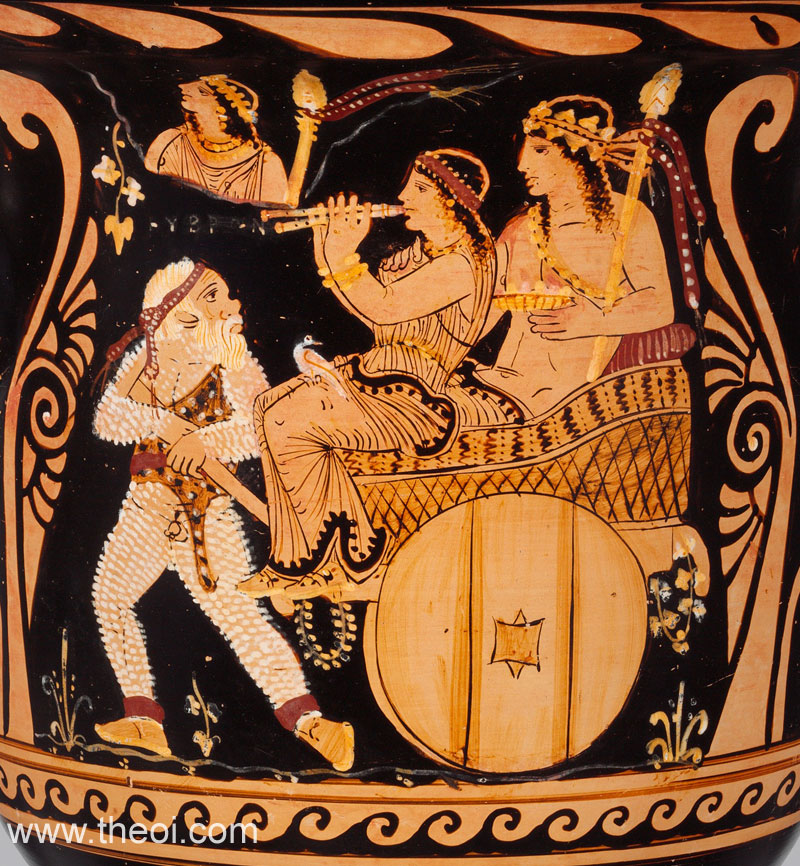
DIONYSOS was the Olympian god of wine, vegetation, pleasure, festivity, madness and frenzy.
This page contains stories of Dionysos from the saga of the gods including the discovery of wine, his refuge with Thetis in the sea, war with Perseus and the Argives, journey to the underworld, ascension to Olympos and role in the War of the Giants.
The first "Myths" page contains the story of his birth and childhood, and the third his wanderings and adventures in Asia Minor, North Africa and the East.
CLASSICAL LITERATURE QUOTES
DIONYSUS & THE DISCOVERY OF WINE
Pseudo-Apollodorus, Bibliotheca 2. 29 (trans. Aldrich) (Greek mythographer C2nd A.D.)
:
"Hermes took him [the infant Dionysos] to the Nymphai of Asian Nysa . . . [in his youth] Dionysos was the
discoverer of the grapevine. After Hera inflicted madness upon him, he wandered over Aigyptos (Egypt) and Syria
[introducing the vine]."
Diodorus Siculus, Library of History 4. 2. 3 (trans. Oldfather) (Greek historian C1st
B.C.) :
"After he [Dionysos] had received his rearing by the Nymphai in Nysa, they say, he made the discovery of
wine and taught mankind how to cultivate the vine."
Oppian, Cynegetica 4. 230 (trans. Mair) (Greek poet C3rd A.D.) :
"When Dionysos was now come to boyhood, he played with the other children; he would cut a fennel stalk and
smite the hard rocks, and from their wounds they poured for the god sweet liquor."
Pseudo-Hyginus, Fabulae 130 (trans. Grant) (Roman mythographer C2nd A.D.)
:
"Father Liber [Dionysos] went out to visit men in order to demonstrate the sweetness and pleasantness of
his fruit . . . he gave a skin full of wine as a gift and bade them spread the use of it in all the other
lands."
Nonnus, Dionysiaca 12. 330 ff (trans. Rouse) (Greek epic C5th A.D.) :
"When Bakkhos saw the [wild] grapes with a bellyful of red juice, he bethought him of an oracle which
prophetic Rheia had spoken long ago. He dug into the rock, he hollowed out a pit in the stone with the sharp
prongs of his earth-burrowing pick, he smoothed the sides of the deepening hold and made an excavation like a
winepress [and made the first ever batch of wine]."
Nonnus, Dionysiaca 12. 394 ff :
"After the revels over his [Dionysos'] sweet fruit [wine newly discovered by the young god], Dionysos
proudly entered the cave of Kybeleid goddess Rheia [his foster mother], waving bunches of grapes in his
flowerloving hand, and taught Maionia the vigil of his feast."
Nonnus, Dionysiaca 13. 470 ff :
"The grapegrowing land of Bakkhos, where the vinegod first mixed wine for Mother Rheia in a brimming cup,
and named the city Kerassai, the Mixings [in Lydia]."
For the related MYTH of Dionysos and Ampelos see:
Dionysus Loves: Ampelos (a boy transformed into the first grape-vine)
DIONYSUS SEEKS REFUGE WITH THETIS
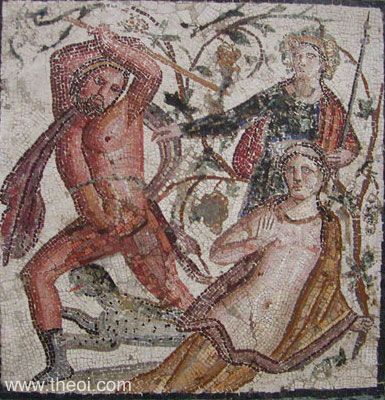
The impious king Lykourgos drove Dionysos and his companions from the land forcing them to seek refuge with Thetis and the gods of the sea.
In the Iliad the story is set during the youthful years of Dionysos on Mount Nysa (Kithairon in Boiotia), however later writers set it in Thrake during the god's wanderings.
For the PRELUDE to this story see Dionysus Wrath: Lycurgus
Homer, Iliad 6. 135 ff (trans. Lattimore) (Greek epic C8th B.C.) :
"[Lykourgos drove Dionysos' followers away], while Dionysos in terror dived into the salt surf, and Thetis
took him to her bosom, frightened, with the strong shivers upon him at the man's blustering."
Homer, Odyssey 24. 75 ff (trans. Shewring) (Greek epic C8th B.C.) :
"Your [Akhilleus'] mother [Thetis] gave us [the Greeks] a golden urn that had two handles (amphiphoreus) -
given her, she said by Dionysos, and made by renowned Hephaistos himself."
Stesichorus, Fragment 234 (from Scholiast on Homer's Iliad) (trans. Campbell, Vol.
Greek Lyric III) (C7th to 6th B.C.) :
"When he [Dionysos] was pursued by Lykourgos and took refuge in the sea, Thetis gave him a kindly welcome,
and he gave her the amphora [a golden urn], Hephaistos' handiwork. She gave it to her son [Akhilleus], so that
when he died his bones might be put in it. The story is told by Stesichorus."
Pseudo-Apollodorus, Bibliotheca 3. 34 (trans. Aldrich) (Greek mythographer C2nd A.D.)
:
"Lykourgos . . . was the first to show hubris to Dionysos by expelling him. Dionysos fled to the sea and
took shelter with Nereus' daughter Thetis."
Quintus Smyrnaeus, Fall of Troy 2. 544 ff (trans. Way) (Greek epic C4th A.D.)
:
"Thetis, wise with wisdom world-renowned; for in her bowers she sheltered Dionysus, chased by might of
murderous Lykourgos from the earth . . . The all-seeing Ouranioi (Heavenly Ones) remember all these things, and
reverence my mother Thetis in divine Olympos."
Quintus Smyrnaeus, Fall of Troy 3. 855 ff :
"A golden vase his mother [Thetis] gave [for the burial of Akhilleus], the gift in old time of Dionysos,
glorious work of the craft-master Hephaistos."
Athenaeus, Deipnosophistae 1. 26b-c (trans. Gullick) (Greek rhetorician C2nd to 3rd
A.D.) :
"Some even assert that the flight of Dionysos into the sea is a hint that the making of wine had long been
known. For wine is sweet when sea water is poured into it."
Pseudo-Hyginus, Astronomica 2. 21 (trans. Grant) (Roman mythographer C2nd A.D.)
:
"They [the Hyades, nurses of Dinoysos] are said to have been put to flight by Lycurgus and all except
Ambrosia took refuge with Thetis, as Asclepiades [Greek poet C3rd B.C.] says."
Nonnus, Dionysiaca 20. 350 ff (trans. Rouse) (Greek epic C5th A.D.) :
"He [Dionysos] thought Kronion [Zeus] was fighting for Lykourgos [who attacked him and his troops of
Bakkhantes], when he heard the thunderclaps rolling in the heavens. He took to his heels in fear and ran too
fast for pursuit, until he plunged into the gray water of the Erythraian Sea.
But Thetis in the deeps embraced him with friendly hands, when he entered within the loud-resounding hall. Then
she comforted him with friendly words, and said : ‘Tell me, Dionysos, why are your looks despondent? No
army of earthborn Arabs has conquered you, no pursuinig mortal man, you fled from no human spear; but Hera,
sister and consort of Zeus Kronides, has armed herself in heaven and fought on the side of Lykourgos--Hera and
stubborn Ares and the brazen sky; Lykourgos the mighty was only a fourth. Often enough your father himself, the
lord of heaven ruling on high, had to give way to Hera! You will have all the more to boast of, when one of the
Blessed shall say--Hera consort and sister of mighty Zeus took arms herself against Dionysos umarmed!’ So
speaking, the Nereis tried to console Bakkhos."
Nonnus, Dionysiaca 21. 170 ff :
"In the Erythraian Sea, the daughters of Nereus [Nereides] cherished Dionysos [driven into the sea by
Lykourgos] at their table, in their halls deep down under the waves . . . So he remained in the hall deep down
in the waves under the waters, and he lay sprawled among the seaweed in Thetis' bosom."
For MORE information on this sea-goddess see THETIS
MADNESS OF DIONYSUS ~ DIONYSUS & THE ASS
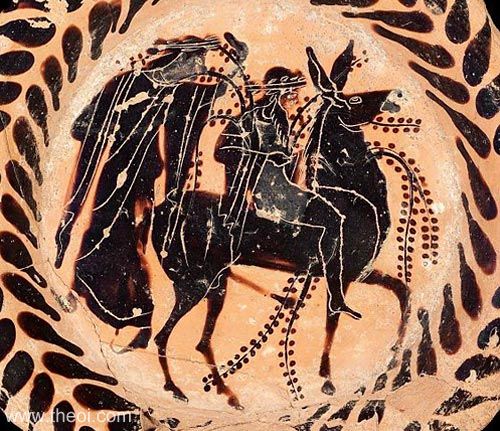
Pseudo-Apollodorus, Bibliotheca 2. 29 (trans. Aldrich) (Greek mythographer C2nd A.D.)
:
"After Hera inflicted madness upon him [Dionysos, after first reaching adulthood], he wandered over
Aigyptos (Egypt) and Syria. The Aigyptian king Proteus first welcomed him [perhaps a confusion with the Argive
king Proitos]."
Pseudo-Hyginus, Astronomica 2. 23 (trans. Grant) (Roman mythographer C2nd A.D.)
:
"In one part of its figure [of the constellation Cancer] there are certain stars called Asses, pictured on
the shell of the Crab by Liber [Dionysos] with two stars only. For Liber, when madness was sent upon him by Juno
[Hera], is said to have fled wildly through Thesprotia intending to reach the oracle of Dodonaean Jove [Zeus] to
ask how he might recover his former sanity. When he came to a certain large swamp which he couldn't cross, it is
said two asses met him. He caught one of them and in this way was carried across, not touching the water at all.
So when he came to the temple of Dodonaean Jove [Zeus], freed at once from his madness, he acknowledged his
tanks to the asses and placed them among the constellations.
Some say he [Dionysos] gave a human voice to the ass which had carried him. This ass later had a contest with
Priapus on a matter of physique, but was defeated and killed by him. Pitying him because of this, Liber
[Dionysos] numbered him among the stars, and so that it should be known that he did this as a god, not as a
timid man fleeing from Juno [Hera], he placed him above the Crab which had been added to the stars by her
kindness."
DIONYSUS' RECAPTURE OF MOUNT CITHAERON
Pseudo-Hyginus, Fabulae 131 (trans. Grant) (Roman mythographer C2nd A.D.)
:
"When Liber [Dionysos] was leading his army into India, he gave the authority over his Theban kingdom to
his nurse Nysus [probably Seilenos is his role as god of mount Nysa-Kithairon] until he should come back. But
after Liber returned from there, Nysus was unwilling to yield the kingdom. Since Liber [Dionysos] didn't want to
quarrel with his nurse he permitted him to keep the kingdom until an opportunity should come to recover it. And
so, three years later, he made up the quarrel with him, and pretended he wanted to celebrate in the state the
sacred rites termed Trieteric, because he performed them after the third year. He introduced soldiers as
Bacchanals in women's dress, captured Nysus, and recovered his kingdom."
For MORE information on the god Nysos see NYSOS and SEILENOS
WAR OF DIONYSUS AGAINST PERSEUS & THE ARGIVES
Dionysos arrived in Argos during his earthly wanderings with troops of women from the Aegean Islands. Perseus (or his grandfather Akrisios) blocked his entry to the city and engaged the god in battle, slaying Ariadne and routing his troops. The two were eventually reconciled, and the cult of the god firmly estabished.
Pseudo-Apollodorus, Bibliotheca 2. 37 (trans. Aldrich) (Greek mythographer C2nd A.D.)
:
"After Dionysos had demonstrated to the Thebans that he was a god, he went to Argos where again he drove
the women mad when the people did not pay him honour, and up in the mountains the women fed on the flesh of the
babies suckling at their breasts."
Pausanias, Description of Greece 2. 20. 4 (trans. Jones) (Greek travelogue C2nd A.D.)
:
"The tomb [in the city of Argos] they call that of the Mainas Khorea, saying that she was one of the women
who joined Dionysos in his expedition against Argos, and that Perseus, being victorious in the battle, put most
of the women to the sword. To the rest they gave a common grave, but to Khorea they gave burial apart because of
her high rank."
Pausanias, Description of Greece 2. 22. 1 :
"Before [the temple of Hera in Argos] it is a grave of women. They were killed in a battle against the
Argives under Perseus, having come from the Aegean Islands to help Dionysos in war; for which reason they are
surnamed Haliai (Women of the Sea)."
Pausanias, Description of Greece 2. 23. 7-8 :
"They say that the god [Dionysos], having made war on Perseus, afterwards laid aside his enmity, and
received great honors at the hands of the Argives, including this precinct set specially apart for himself. It
was afterwards called the precinct of Kres (the Kretan), because, when Ariadne died, Dionysos buried her here.
But Lykeas says that when the [new] temple [of Dionysos] was being rebuilt an earthenware coffin was found, and
that it was Ariadne's. He also said that both he himself and other Argives had seen it."
Ovid, Metamorphoses 4. 605 ff (trans. Melville) (Roman epic C1st B.C. to C1st A.D.)
:
"[Dionysos], conqueror of India, worshipped in the new-built shrines of Greece. Only Acrisius Abantiades of
the same lineage, barred him from his city, Argos, by force of arms, and still denied Jove [Zeus] was his
father, just as he denied [his grandson] Perseus could be Jove's [Zeus'] son . . . Yet ere long (so sure the
power of truth) Acrisius repented of his violence to the god."
Seneca, Oedipus 486 ff (trans. Miller) (Roman tragedy C1st A.D.) :
"[On the conquests of Dionysos:] The Proetides fled to the woods, and Argos, in his stepdame's [Hera's]
very presence, paid homage to Bacchus [Dionysos]."
The war of Dionysos and Perseus is described in detail in Book 47 of Nonnus' Dionysiaca. A couple of passages are quoted here describing the death of Ariadne:--
Nonnus, Dionysiaca 25. 104 ff (trans. Rouse) (Greek epic C5th A.D.) :
"[The Argive river] Inakhos was witness to both [Perseus and Dionysos], when the heavy bronze pikes of
Mykenai resisted the ivy and deadly fennel, when Perseus sickle in hand gave way to Bakkhos with his wand, and
fled before the fury of Satyroi cyring Euoi; Perseus cast a raging spear, and hit frail Ariadne unarmed instead
of Lyaios the warrior. I do not admire Perseus for killing one woman, in her bridal dress still breathing of
love."
Nonnus, Dionysiaca 47. 665 ff :
"He [Perseus in his battle with Dionysos] shook in his hand the deadly face of Medousa, and turned armed
Ariadne into stone. Bakkhos was even more furious when he saw his bride all stone . . .
[Hermes arrives at the battlefield and addresses Dionysos :] ‘She [Ariadne] has died in battle, a glorious
fate, and you ought to think Ariadne happy in her death, because she found one so great [Perseus] to slay her .
. . Come now, lay down your thyrsus, let the winds blow battle away, and fix the selfmade image of mortal
Ariadne where the image of heavenly Hera stands [in Argos].’"
For a related MYTH of Dionysos in Argos see Dionysus Wrath: the Proetides
DRINKING CONTEST OF DIONYSUS & HERACLES
Herakles once challenged the god Dionysos to a friendly drinking contest. This little known story is depicted in classical art.
JOURNEY OF DIONYSUS TO THE UNDERWORLD
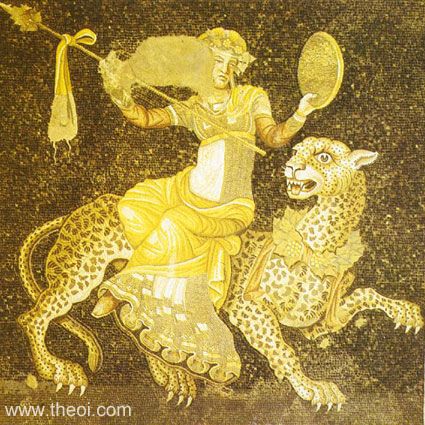
Dionysos descended into the underworld to bring his mother Semele (and perhaps also his wife Ariadne) back from the dead.
Hesiod, Theogony 940 ff (trans. Evelyn-White) (Greek epic C8th or 7th B.C.)
:
"And Semele, daughter of Kadmos . . . [bare] Dionysos,-- a mortal woman an immortal son. And now they both
are gods."
Pseudo-Apollodorus, Bibliotheca 3. 38 (trans. Aldrich) (Greek mythographer C2nd A.D.)
:
"He [Dionysos] retrieved his mother from Hades' realm, gave her the name Thyone, and escorted her up to the
sky."
Pausanias, Description of Greece 2. 31. 2 (trans. Jones) (Greek travelogue C2nd A.D.)
:
"[In the temple of Artemis at Troizenos in Argolis] are altars to the gods said to rule under the earth. It
is here that they say Semele was brought out of Haides by Dionysos, and that Herakles dragged up the Hound of
Haides. But I cannot bring myself to believe even that Semele died at all, seeing that she was the wife of
Zeus."
Pausanias, Description of Greece 2. 37. 6 :
"The Alkyonian Lake [near Nemea, Argos], through which the Argives say Dionysos went down to Haides to
bring up Semele, adding that the descent here was shown him by Polymnos . . . The nocturnal rites performed
every year in honor of Dionysus I must not divulge to the world at large."
Pausanias, Description of Greece 3. 19. 3 :
"On the altar [of the Amyklaian at Amyklai, Lakedaimonia] are wrought in relief . . . [images of] Zeus and
Hermes are conversing; near stand Dionysos and Semele, with Ino by her side [after their ascension to
Olympos]."
Diodorus Siculus, Library of History 4. 25. 4 (trans. Oldfather) (Greek historian
C1st B.C.) :
"The myths relate that Dionysos brought up his mother Semele from Hades, and that, sharing with her his own
immortality, he changed her name to Thyone."
Pseudo-Hyginus, Fabulae 251 (trans. Grant) (Roman mythographer C2nd A.D.)
:
"Those who, by permission of the Parcae [Moirai, Fates], returned from the lower world . . . Father Liber
[Dionysos]; he descended for Semele, his mother, daughter of Cadmus."
Pseudo-Hyginus, Astronomica 2. 5 :
"Those who wrote the Argolica give the following reason [for the constellation Corona]. When Liber
[Dionysos] received permission from his father [Zeus] to bring back his mother Semele from the Lower World, and
in seeking a place of descent had come to the land of the Argives, a certain Hyplipnus met him, a man worthy of
that generation, who was to show the entrance to Liber in answer to his request. However, when Hypolipnus saw
him, a mere boy in years, excelling all others in remarkable beauty of form, he asked from him the reward that
could be given without loss. Liber, however, eager for his mother, swore that if he brought her back, he would
do as he wished, on terms, though, that a god could swear to a shameless man. At this, Hypolipnus showed the
entrance. So then, when Liber came to that place and was about to descend, he left the crown, which he had
received as a gift from Venus [Aphrodite], at that place which in consequence is called Stephanos, for he was
unwilling to take it with him for fear the immortal gift of the gods would be contaminated by contact with the
dead. When he brought his mother back unharmed, he is said to have placed the crown in the stars as an
everlasting memorial."
Clement of Alexandria, Exhortation to the Greeks 2. 30 (trans. Butterworth) (Greek
Christian rhetoric C2nd A.D.) :
[N.B. The following passage is from an early Christian writer's critique of the pagan gods.]
"Dionysos was anxious to descend into Haides, but did not know the way. Thereupon a certain man, Prosymnos
by name, promises to tell him; though not without reward . . . It was a favour of lust, this reward which
Dionysos was asked for. The god is willing to grant the request; and so he promises, in the event of his return,
to fulfil the wish of Prosymnos, confirming the promise with an oath. Having learnt the way he set out, and came
back again. He does not find Prosymnos, for he was dead. In fulfilment of the vow to his lover Dionysos hastens
to the tomb and indulges his unnatural lust. Cutting off a branch from a fig-tree which was at hand, he shaped
it into the likeness of a phallus, and then made a show of fulfilling his promise to the dead man. As a mystic
memorial of this passion phalloi are set up to Dionysos in cities. ‘For if it were not to Dionysos that
hey held solemn procession and sang the phallic hymn, they would be acting most shamefully,’ says
Herakleitos."
Aristophanes comedy play The Frogs (not quoted here) is a spoof of Dionysos' journey to the underworld. In this comedy the god journeys to Hades to bring back his favourite writer of tragedy.
For MORE information the goddess mother of the god see THYONE
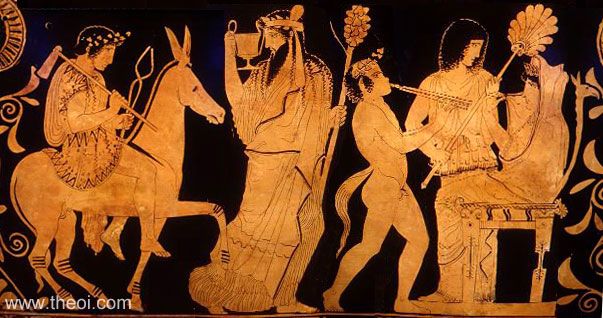
THE DIVINITY-APOTHEOSIS OF DIONYSUS
Dionysos achieves full apotheosis or recognition as a god once his earthly wanderings were complete. The story of his final acension to heaven follows his journey to Haides (below), in which he displays his supremacy over death, and the fetching of Hephaistos for the entry of the two gods into Olympos (below).
Pseudo-Apollodorus, Bibliotheca 3. 38 (trans. Aldrich) (Greek mythographer C2nd A.D.)
:
"With events like these [the miracles performed during his earthly wanderings], men learned that Dionysos
was a god, and they began to honour him."
Pseudo-Hyginus, Fabulae 224 (trans. Grant) (Roman mythographer C2nd A.D.)
:
"Mortals who were made immortal . . . Liber [Dionysos], son of Jove [Zeus] and Semele."
Ovid, Metamorphoses 4. 605 ff (trans. Melville) (Roman epic C1st B.C. to C1st A.D.)
:
"[Dionysos], conqueror of India, worshipped in the new-built shrines of Greece . . . was placed among the
gods of heaven."
Seneca, Hercules Furens 16 ff (trans. Miller) (Roman tragedy C1st A.D.) :
"Not alone has Bacchus [Dionysos] himself or the [Semele] mother of Bacchus attained the skies . . . [but
also] the heavens wear the crown of the Cretan maid [Ariadne]."
Seneca, Hercules Furens 65 ff :
"Nor will he [Herakles] come to the stars by a peaceful journey as Bacchus [Dionysos] did."
Seneca, Oedipus 497 ff :
"The new-made bride [Ariadne] is led to the lofty heavens [alongside Dionysos]; Phoebus [Apollon] a stately
anthem sings, with his locks flowing down his shoulders, and twin Cupides [Erotes] brandish their torches.
Jupiter [Zeus] lays aside his fiery weapons and, when Bacchus comes, abhors his thunderbolt."
For MYTHS related to the apotheosis of Dionysos and his ascension to Olympos see:
(1) Journey of Dionysus to the Underworld (he conquers death)
(2) Ascension of Dionysus & Hephaestus to Olympus (joins the Olympian gods)
ASCENSION OF DIONYSUS & HEPHAESTUS TO OLYMPUS
Pausanias, Description of Greece 1. 20. 2-3 (trans. Jones) (Greek travelogue C2nd
A.D.) :
"There are paintings here [in the temple of Dionysos at Athens]--Dionysus bringing Hephaistos up to heaven.
One of the Greek legends is that Hephaistos, when he was born, was thrown down by Hera. In revenge he sent as a
gift a golden chair with invisible fetters. When Hera sat down she was held fast, and Hephaistos refused to
listen to any other of the gods save Dionysos--in him he reposed the fullest trust--and after making him drunk
Dionysos brought him to heaven."
Pseudo-Hyginus, Fabulae 166 (trans. Grant) (Roman mythographer C2nd A.D.)
:
"When Vulcanus [Hephaistos, still living in exile after being cast from Olympos at birth] had made golden
[thrones or sandals] for Jove [Zeus] and for the other gods, he made one of adamant [for Juno or Hera], and as
soon as she sat down she suddenly found herself hanging in the air. When Vulcanus [Hephaistos] was summoned to
free his mother whom he had bound, in anger because he had been thrown from Heaven, he denied that he had a
mother. When Father Liber [Dionysos] had brought him back drunk to the council of the gods, he could not refuse
this filial duty."
[N.B. This story probably comes from the Corastae of Epicharmus, a playwright of the C5th B.C.]
Depictions of Dionysos leading Hephaistos in his return to Olympos were popular in C5th B.C. Athenian vase painting.
For MORE information on this god see HEPHAISTOS
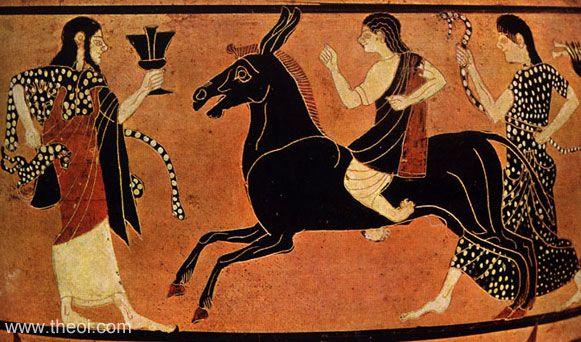
DIONYSUS & THE WAR OF THE GIANTS
Pseudo-Apollodorus, Bibliotheca 1. 37 (trans. Aldrich) (Greek mythographer C2nd A.D.)
:
"[In the War of the Giants :] Dionysos slew [the Gigante] Eurytos with his thyrsos."
Diodorus Siculus, Library of History 4. 15. 1 (trans. Oldfather) (Greek historian
C1st B.C.) :
"The Gigantes about Pallene chose to begin war against the immortals . . . [and] Zeus gave the name of
Olympian only to those gods who had fought by his side, in order that the courageous, by being adorned by so
honourable a title, might be distinguished by this designation from the coward; and of those who were born of
mortal women he considered only Dionysos and Herakles worthy of this name."
Pseudo-Hyginus, Astronomica 2. 23 (trans. Grant) (Roman mythographer C2nd A.D.)
:
"According to Eratosthenes [Greek writer C3rd B.C.], another story is told about the Asses. After Jupiter
[Zeus] had declared war on the Gigantes, he summoned all the gods to combat them, and Father Liber [Dionysos],
Vulcanus [Hephaistos], the Satyri, and the Sileni came riding on asses. Since they were not far from the enemy,
the asses were terrified, and individually let out a braying such as the Gigantes had never heard. At the noise
the enemy took hastily to flight, and thus were defeated."
Nonnus, Dionysiaca 1. 18 ff (trans. Rouse) (Greek epic C5th A.D.) :
"With ivy-wreathed wand he [Dionysos] destroyed the horrid hosts of Gigantes serpent-haired."
Nonnus, Dionysiaca 25. 85 ff :
"Bakkhos repaid the stubble of snakehaired Gigantes, a conquering hero with a tiny manbreaking wand, when
he cast the battling ivy against Porphyrion, when he buffelted Enkelados and drove Alkyoneus with a volley of
leaves: then the wands flew in showers, and brought the Gegenees (Earthborn) down in defence of Olympos, when
the coiling sons of Gaia with two hundred hands [ie there were a hundred Gigantes], who pressed the starry vault
with manynecked heads, bent the knee before a flimsy javelin of vineleaves or a spear of ivy. Not so great a
swarm fell to the fiery thunderbolt as fell to the manbreaking thyrsus."
Nonnus, Dionysiaca 25. 206 ff :
"Euios [Dionysos] wand in hand cut down the snaky sons of Gaia [the Gigantes] alone - that champion of
Zeus! attacked them all, with huge serpents flowing over their shoulders equally on both sides much bigger than
the Inakhian snake, while they went hissing restlessly about among the stars of heaven."
Nonnus, Dionysiaca 48. 6 ff :
"[Hera] addressed her deceitful prayers to Allmother Gaia, crying out upon the doings of Zeus and the
valour of Dionysos [with whom she was still wrathful] . . . Then she armed all around Bakkhos the
mountainranging tribes of Gigantes, Gaia's (Earth's) own brood, and goaded her own sons to battle : ‘My
sons, make your attack with hightowering rocks against clustergarlanded Dionysos--catch this Indianslayer, this
destroyer of my family, this son of Zeus . . . Bring Dionysos to me, that I may enrage Kronion [Zeus] when he
sees Lyaios a slave and the captive of my spear. Or wound him with cutting steel and kill him for me like
Zagreus, that one may say, god or mortal, that Gaia in her anger has twice armed her slayers against the breed
of Kronides--the older Titanes against the former Dionysos [Zagreus], the younger Gigantes against Dionysos
later born.’
With these words she excited all the host of the Gigantes, and the battalions of the Gegenees (Earthborn) set
forth to war, one bearing a bulwark of Nysa, one who had sliced off with steel the flank of a cloudhigh
precipice, each withthese rocks for missiles armed him against Dionysos; one hastened to the conflict bearing
the rocky hill of some land with its base in the brine, another with a reef torn from a brinegirt isthmus.
Peloreus took up Pelion with hightowering peak as a missile in his innumberable arms . . . But Bakkhos held a
bunch of giantsbane vine, and ran at Alkyoneus with the mountain upraised in his hands : he wielded no furious
lance, no deadly sword, but he struck with this bunch of tendrils and shore off the multitudinous hands of the
Gigantes; the terrible swarms of groundbred serpents were shorn off by those tippling leaves, the Gigantes'
heads with those viper tresses were cut off and the severed necks danced in the dust. Tribes innumerable were
destroyed; from the slain Gigantes ran everflowing rivers of blood, crimson torrents newly poured coloured the
ravines red. The swarms of earthbred snakes ran wild with fear before the tresses of Dionysos viperwreathed.
Fire was also a weapon of Bakkhos. He cast a torch in the air to destroy his adversaries: through the high paths
ran the Bakkhic flame leaping and curling over itself and shooting down corrosive sparks on the Gigante's limbs;
and there was a serpent with a blaze in his threatening mouth, half-burnt and whistling with a firescorched
throat, spitting out smoke instead of a spurt of deadly poison.
There was infinite tumult. Bakkhos raised himself and lifted his fighting torch over the heads of his
adversaries, and roasted the Gigantes' bodies with a great conflagration, an image on earth of the thunderbolt
cast by Zeus. The torches blazed: fire was rolling all over the head of Enkelados and making the air hot, but it
did not vanquish him--Enkelados bent not his knee in the steam of the earthly fire, since he was reserved for
the thunderbolt. Vast Alkyoneus leapt upon Lyaios [Dionysos] armed with his Thrakian crags; he lifted over
Bakkhos a cloudhigh peak of wintry Haimos--useless against that mark, Dionysos the invulnerable. He there the
cliff, but when the rocks touched the fawnskin of Lyaios, they could not tear it, and burst into splinters
themselves. Typhoeus towering high had stript the mountains of Emathia (a younger Typhoeus in all parts like the
older, who once had lifted many a rugged strip of his mother earth), and cast the rocky missiles at Dionysos.
Lord Bakkhos pulled away the sword of one that was gasping on the ground and attacked the Gigantes' heads,
cutting the snaky crop of poison-spitting hair; even without weapon he destroyed the selfmarshalled host,
fighting furiously, and using the treeclimbing longleaf ivy to strike the Gigantes. Indeed he would have slain
all with his manbreaking thyrsos, if he had not retired of his own will out of the fray and left enemies alive
for his Father."
For MORE information on the War of the Giants see GIGANTES
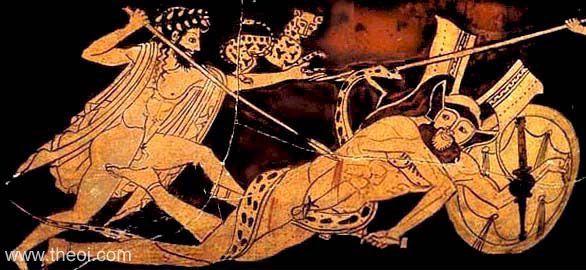
DIONYSUS IN THE FABLES OF AESOP
Aesop, Fables 517 (from Phaedrus 4. 16) (trans. Gibbs) (Greek fable C6th B.C.)
:
"Someone asked Aesop why lesbians and effeminates [or gay men] had been created, and old Aesop explained,
‘The answer lies once again with Prometheus, the original creator of our common clay. All day long,
Prometheus had been separately shaping those natural members which modesty conceals beneath our clothes, and
when he was about to apply these private parts to the appropriate bodies Liber [Dionysos] unexpectedly invited
him to dinner. Prometheus came home late, unsteady on his feet and with a good deal of heavenly nectar flowing
through his veins. With his wits half asleep in a drunken haze he stuck the female genitalia on male bodies and
male members on the ladies. This is why modern lust revels in perverted pleasures.’"
SOURCES
GREEK
- Homer, The Iliad - Greek Epic C8th B.C.
- Homer, The Odyssey - Greek Epic C8th B.C.
- Hesiod, Theogony - Greek Epic C8th - 7th B.C.
- Aesop, Fables - Greek Fables C6th B.C.
- Greek Lyric III Stesichorus, Fragments - Greek Lyric C7th - 6th B.C.
- Euripides, Bacchae - Greek Tragedy C5th B.C.
- Apollodorus, The Library - Greek Mythography C2nd A.D.
- Diodorus Siculus, The Library of History - Greek History C1st B.C.
- Pausanias, Description of Greece - Greek Travelogue C2nd A.D.
- Athenaeus, Deipnosophistae - Greek Rhetoric C3rd A.D.
- Oppian, Cynegetica - Greek Poetry C3rd A.D.
- Clement, Exhortation to the Greeks - Christian Scholar C2nd A.D.
- Quintus Smyrnaeus, Fall of Troy - Greek Epic C4th A.D.
- Nonnus, Dionysiaca - Greek Epic C5th A.D.
ROMAN
- Hyginus, Fabulae - Latin Mythography C2nd A.D.
- Hyginus, Astronomica - Latin Mythography C2nd A.D.
- Ovid, Metamorphoses - Latin Epic C1st B.C. - C1st A.D.
- Seneca, Hercules Furens - Latin Tragedy C1st A.D.
- Seneca, Oedipus - Latin Tragedy C1st A.D.
BIBLIOGRAPHY
A complete bibliography of the translations quoted on this page.